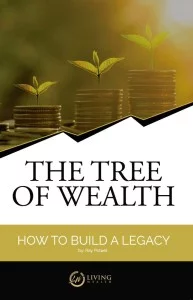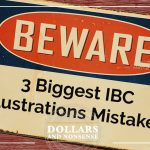In this episode, we sit down with a special guest, Ray Poteet — the founder of Living Wealth. We discuss the biggest investment pitfalls to be aware of and how you can learn from his mistakes, so you won’t have to suffer like he did.
How to spot investment pitfalls is harder than experiencing them. And the road to growing your financial freedom is littered with landmines. Some are similar, but most tend to be unique and hard to spot the first time around. Sometimes we even repeat mistakes if they’re not pointed out to us by a trusted guide.
They’re not hard to spot. You just have to know what you’re looking for. And, Ray shares the worst of them in this episode.
Investment Pitfalls Shared and Topics Discussed:
- The folly of looking at rates
- When an advisor doesn’t own the things they sell
- The danger of chasing “the next big thing”
- When you should never borrow to invest
- Why money needs to always be in motion
- Staying platonic with investments and keeping with rational investment decisions
Want Financial Freedom?

Start your journey to financial freedom with this first step.
Get our 122 page eBook The Tree of Wealth here now.
Podcast transcript for episode 23: The Biggest Investment Pitfalls
Nate: In this episode we have brought in special guest, Ray Poteet, founder of Living Wealth to discuss the biggest investment pitfalls to be aware of and how you can learn from his mistakes so you won’t have to suffer like he did. She’s Holly and she helps people find financial freedom.
Holly: He’s Nate. He makes sense out of money. This is Dollars and Nonsense. If you follow the herd, you will be slaughtered.
Nate: All right, Ray. Thanks for being on with us today and we thought it would be a great time to share with our listeners the mentor for both Holly and me. What you’ve taught us. We know you’ve been through the rigamarole, the gamut of investing and some failures in there. We thought you’d be the perfect person to interview for this to maybe give the listeners an idea of what a bad investment looks like and how to spot on a mile away so they won’t have to jump in.
Ray Poteet: How to spot it might be harder than experiencing it. The reality is as you shared with me last week to give you some examples. It was really interesting what the Lord brought to me, but the first one was that I was mesmerized and fooled like everyone else. I saw the big cars, the nice offices, the way they dressed and thought, gosh this has to work. They must be doing it. As I look back and have went through that myself, I realized it wasn’t the investments that they had encouraged me to get into or things like that, it was the commissions and the fees that were being made off the money I was giving them.
As I grew I realized that I had been sort of hoodwinked to look at rates. Even as I got into the market and started managing money, I looked at rates and never really was taught to look at anything but rates. As you know, that changed dramatically in 2001, but up to that time I’d worked hard through the really qualified plans. Porting the money, bringing it in, waiting for retirement and it was interesting, I never got phone calls from the clients while the market was going up. I got all kinds of phone calls when the market was going down and there was no stability.
We had a really chasing mode. Okay, while it was going up we got in at the wrong time. When it was going down we got out at the wrong time. All kinds of things, but it was all really dealt and based on the premise of what I had saw from others. As I was in the market I realized, I wasn’t getting rich off my holdings, I was getting rich off the selling of the products and the fees that I was getting from it. I thought that-
Nate: You were making more money then your clients were is what you’re saying.
Ray Poteet: A lot more.
Nate: Yeah.
Ray Poteet: A lot more. In other words, I was in everything I had recommended for my clients, if it was bad for them it was terrible for me. I had some terrible experiences, but I was doing very well financially not from the investments but from the fees and commissions and was never taught any different. Not by the industry or by the people I was around until 2001. That was really a breakthrough time period. The very thing I would say is look at the people that you respect financially. Look how they’re dressed, look what they drive, look where they live and there’s a lot of phonies going on. A lot of people that pretend they’ve got money and they don’t. I’ve seen this in the industry just since I’ve been in it.
What amazes me is how many counselors there are that are recommending products that they don’t own. I’ll go back to my dad, he gave me really sound advice and I’ve used it since I’ve been in business. That is if it isn’t good enough to buy, it isn’t good enough to sell. There’s a lot of people that don’t practice that. I would tell you the number one thing, don’t get deceived by where they live, what they drive, how they look or where their office is, but ask to see their portfolio. That would be one of the very first things. You’re asking me to buy this, one of the things to just throw back, do you own it and how much of it? If not, why would you recommend it to me? Most of them say, well that’s not really the point.
I would say that number one issue is buy things that they buy, do what they do, if they’re on the up and up. That’s why today I feel very good about what we’re doing. I own everything that we present and I really do mean it would be terrible for me if it’s bad for you, because I’m putting a lot more money in it than most of my clients are. There are a few that are putting more in it than me, but it is very important not to get deceived. I think it would be almost better if you were blind and had somebody reading things for you because the eye is very deceitful because it believes many of the things it sees, even counterfeit.
Nate: Right. Okay. You’re saying that the first thing to do is don’t let your ears get tickled.
Ray Poteet: Don’t let your ears and eyes.
Nate: And eyes get tickled.
Ray Poteet: Tickled. Deal with reality.
Nate: Yeah, exactly. Find the truth. If I was going to put one that’s what I would say as a big investment pitfall is just people running around trying to find the next big thing. Everyone else is just trying to tickle your ears with something-
Ray Poteet: Right.
Nate: -spectacular. They’ll only tell you all the good stuff about it. What is it, Warren Buffet who says, “Always know what you’ve got in to lose.” Rule number one is don’t lose money. Rule number two is don’t forget rule number one, which is-
Ray Poteet: Right.
Nate: -know what you’ve got to lose. If you can stomach that …
Ray Poteet: I look back. Young, trying to be like my dad and others at an age that I was where they were 20 years older than me, had went through things. I borrowed money for investments, stupid, stupid, stupid, stupid. If you don’t have the money to lose, don’t do it. Okay? You lose it and have to pay it back.
Nate: Yeah. Wow.
Ray Poteet: That’s a double whammy. So many people get enticed. Like you say, their ears are tickled. Their eyes are blurred. They’ll do things they shouldn’t do because they don’t have the money. If you don’t have money, don’t go trying to make money when you don’t have any. Get some. I would say. I look back and I put our family through hell, I would say, just because of ignorance on my part in not having a mentor in the financial arena.
Holly: I think, too, it’s also don’t judge a book by its cover. We often see that they have all this good stuff, but really the reality is that maybe the car’s leased, they’re living paycheck to paycheck and they’re just trying to make that next paycheck and make ends meet versus you’re the one that’s coming along that’s going to do the investment because all you hear is the rate versus what’s actual. We talk about that too. The rate of return versus the actual return is really key. The one point I’m going to say that Ray brought out that’s really, really vital is if they don’t own it, why are they selling it? The person that you’re in business with and working with and you’re looking to for investing, if they’re not going to invest in the same product or what they’re trying to sell you, there’s obviously a reason why in my view point.
Nate: Absolutely. You want to find people who own it just because they’re passionate about it too. They didn’t just hear something from somebody and say, “Oh I think I can sell that.”
Ray Poteet: Right.
Nate: That sounds good enough for me to sell. Whether or not it’s actually good, that’s up in the air, but they think they can sell it. If they thought it was good, they would buy it and then they’d say, “Yeah, this is really great. I’m going to go see if other people want to do it, too.” Absolutely. What has been, Ray, your biggest lesson to learn? You’ve told me a few of the lessons in the past of things that have gone south and you’ve lost a ton of money. What are some of the biggest losses you’ve had and thinking back on what have you learned from it? What would be different about it today?
Ray Poteet: Biggest loss was borrowing on a stock on margin, continuing to buy it, having to come up with money and then selling it at a much lower price than I paid for it. In other words, getting enamored with a stock or an investment and having good money chase bad money to continue to make it worse.
Nate: Hoping that it’s going to rebound.
Ray Poteet: You just believed … You somehow get pictured in your mind that what is occurring is going to change and you don’t read the signals. You think you know more than what’s going on. I just think about that. They say dollar cost average. I’ve done that with a number of investments going down and I can remember a stock that I’ve paid $82 for … Lucent, which was Bell Labs, from $60 to $80 and it went all the way to $1. I made more money buying thousands of shares at a $1 and selling it at $2 than I ever did in the growth of the stock. Only lost a couple hundred thousand, so it was a good lesson. Thinking that it had to come back. This was at the beginning of the technology age. They didn’t keep up with other companies with routers and various things. They ended up getting sold to a French company.
Don’t keep holding something when all the reports say it’s not going to turn around or you believe it is. Remember it’s an investment. I think that too many people get emotional about investments rather than what Rabbi Daniel [Lapin 00:10:51] tells us, “This is a business decision and all business decisions should be made with the brain and not the heart. Not emotions involved in it whatsoever.” Wow. If I had been told that and shared that at a younger age, we’d have a lot more financially. We’re doing well financially. God’s been very good to us, but I think about what other people have because of my mistakes. I made them wealthy. It was a learning lesson.
Nate: Yeah.
Ray Poteet: Some people never learn and some people are very smart from the beginning because of the counsel and guidance they’d had from others.
Nate: Great. I think we’ll go and have a quick word from our sponsor and be right back.
Holly: Are you tired of being stressed about money? The Dollars and Nonsense podcast is sponsored by Living Wealth. Visit livingwealth.com/freedom to get your free smart money ebook and sign up for a personal wealth presentation today. Living Wealth is a family owned and operated business which works with individuals, families and even businesses to slay the money stress dragon. Our clients receive individual coaching regarding wealth creation ad how to create a retirement income. You’ll be enabled to have cash today and in the future. Since 1972 Living Wealth has been committed to educating smart people on basic money principles to assist them in becoming debt free and finally find financial freedom. Let us help set you free. Remember to visit livingwealth.com/freedom to receive your free ebook and even sign up for an individual wealth presentation today.
Nate: If you like the work we do here, be sure to tell others what you think. Leave a review on iTunes. You can go to livingwealth.com/iTunes to get to the show quickly.
Holly: Once in iTunes click on the ratings and review then click the button that says write a review. Just a few nice words and a five star review is all we ask.
Welcome back to Dollars and Nonsense. We’re here with Ray Poteet talking about investment pitfalls. The second one he shared right before we left was basically making a decision with really your heart verus your head and viewing an investment that it should be a business decision, but don’t convince yourself that just because it’s going south that it’s going to ever get better. You need to really look at the numbers and what’s out there. If it is going south that basically maybe you do need to get rid of it, versus hoping that it’s going to change and not viewing that investment as a business decision but with your heart or your emotions. I know as a woman, I often can make decisions based on my emotions and feelings versus what my head or logic is thinking. Just remember that and do you have a third one, Ray, that you would like to share with our audience?
Ray Poteet: I want to bring up something new that if I had known in the old it would’ve made a lot of difference. I’ve asked a number of individuals as I was going through the seasons of my life, you might say, and didn’t listen to any of them. I’m thinking of a home builder that says he always used his money when the rates were high and used the bank monies when the rates were low. I was thinking you ought to use your money all the time, so he’s not too smart, but he had a lot more than I did. What he told me to do was to make sure my money moved. I didn’t understand that until 2001. Even though we were managing money and various things, it didn’t click.
I think too often we don’t look at the total value of money. What I mean by that, let’s say I get a 10% return and they think that’s great. On $10,000 that’s $1,000 a year, but if I had made a $10,000 loan at 10%, I’d not only have that interest, but the cash flow, I’d be in a much better position to do other things because I’d have a bigger pile of money. I would say really learn how money works. Look at a bank. Look at a grocery store. Look at places that are making money. Look at contractors. Look at business owners. Look at car dealerships. How they make money and it’s by motion. Get with someone that understands the motion of money rather than the investment and always looking at the rate.
There’s a great YouTube out by John Bogle. I was in the industry and didn’t even know this, that if stop and think about it, you put in 100% of the money, so you take 100% of the risk and get a small share of the profit. If you understood it that way, I don’t think you’d ever get into it.
Nate: You’re talking about mutual funds?
Ray Poteet: Mutual funds or even any investment.
Nate: Banking, yeah.
Ray Poteet: Right. People say, “Well, we made a lot of money off Apple.” That was the law of supply and demand. A lot of people lost money on telephone companies and airlines, okay? Law of supply and demand. There will be cycles. Don’t get hooked because it was a great company at one time. I’m thinking of Bell & Howell. I’m thinking of Eastman Kodak. Those were great companies. Everybody’s using digital cameras now on their phones and Eastman Kodak’s no longer exist, okay? I would say allow your wisdom and your spirit to guide you and direct you. I was just thinking I think the next era is really good for restaurants because in 2016, for the first time in the history of the US, people spent more money eating out then they did at grocery stores.
This tells you something. People are getting more and more excited or actual patterns of working long hours, don’t want to fix food, or it’s quick fix. All you have to do is see the expansion of the frozen dinners in the grocery store. They’re going out to eat so they’re spending money. Matter of fact, I even thought and spoke with my wife that we’re spending more in one week eating out than we used to spend in a month for groceries when our kids were growing up. She said, “Really?” I said, “One meal costs us this.” That’s more than we used to spend. There’s inflation, there’s a lot of things going on, but we’re an ideal example of that.
Now, it doesn’t hinder our budget to do that, because of the things I’ve learned, but I think young people especially have to be very, very careful and I would say it this way. Know that the cause of not having money generally are flexible expenses, not set expenses. What I mean by that? Eating out, shows, entertainment. Your fixed expenses are a house payment, rent, car. Those don’t generally cause the budget to go whacko. It’s not controlling the flexible expenses.
Nate: Yeah. I think you hit a point too that I wanted to kind of expound on, which is past experience doesn’t always indicate future results.
Ray Poteet: Amen.
Nate: As you mentioned with Kodak and good companies. I think you’ve got to use your head. Don’t just say, “Oh, I’ve done well here. I’m not going to leave or I’m not going to sell a bunch of stock.” Or something like that. I think people get blinded. They get greedy and they say, “Well, if I get out now think of what I can miss.” Well, it just happens to be that, as you said, cycles happen. Things go up in value and they come down. They go up in value and they come down. I’ve had people say, “Well, Nate, the past seven- eight years have been great in my portfolio.” They don’t want to make some changes, but yet a lot of the writing on the wall says where things go up, they must come down. Ride the wave up, but be conscious that it’s not going to keep going up for forever. It never has. Very rarely does any true investment go up forever.
Ray Poteet: Correct.
Nate: Be wise about it. That’s what I would say too, as you mentioned, use your head. Think about these things and don’t just get caught up in the numbers game. The smart people are the ones who get out before the crash.
Ray Poteet: Right. I spoke with a-
Nate: Go ahead.
Ray Poteet: -client yesterday. His wife was very concerned that they were not diversified. I said, “You can go diversified with the money you have.” In the same breath she talked about her dad. She was saying, “Well, we’re not in the market.” Then she said her dad was in the market during 2008 and 2009 and lost over 60% of his qualified plan that he was planning on using to retire in 2010 and he’s still working. He’s been working right now seven years more than he planned on it. She said the value of his plan, even though he has continued to contribute, even though we’re at the highest point ever in the market, just now has equaled what he had in 2008 and 2009. That’s with the additional money going in and growth.
Now he’s thinking, well maybe I ought to retire. I just said, “Ask him one question, is he going to leave it in the market because he might end up going back to work.” I think we can see that very clearly. Walmart, the greeters. Costco, Sam’s, the people serving snacks on the weekends or during the day. They’re not young people. I don’t think they’re really wanting to do that, unless they just get a charge out of it, but they’ve got to eat. They’ve got to have money for utilities. I’m saying, just have a foundation and understanding how money works. If you have cash flow regardless of your age, you can do the things you want.
Nate: Yeah. Holly, you have anything else too?
Holly: I think the last point too, you said, one of the keys was that you need to keep your money in motion and not just go park it somewhere. Soon as you park it, you’re giving it over to somebody else to use and make the money off of. Key there, if you’re taking it and you’re parking it somewhere and somebody else is using it to make money, chances are you’re not the one winning there.
Nate: Yeah.
Holly: It’s the person that’s controlling the money and making the money off you.
Nate: Yeah. I’ve got, I guess, one more point that just came in because of that, which was you hear a lot, especially of the people in real estate, who in the last crash in ’06-’07, lost everything. Businesses, their entire portfolio and things. Why did that happen? Why did they lose everything? Why weren’t they able to keep the homes even though the price went down? Various things would have happened, but one of them was … This is my thoughts. I wasn’t there, I didn’t lose the money, but my thoughts are you didn’t have money, you had assets. Or as we would say, you are asset rich, you’re cash poor. They said, man, real estate’s always going to go up. If you throw all the money into it, you’ve got no cash on the side; so if something does happen and you start missing a payment or two on those loans that you use to build your empire, you start getting foreclosures or you file bankruptcy very soon because you don’t have any capital.
That would be, I guess, my last investment pitfall is don’t throw everything into things that are locked up. That would be real estate or things like that. If you have everything that cannot be put in motion, you’re setting yourself up to lose everything, especially, as Ray said, if you use other people’s money to make it happen. They’ll take your assets and you’ll be left with nothing and a bankruptcy on your record. Anything else, Ray?
Ray Poteet: No. Just that those time periods you mentioned, we did very, very well because we had control of the assets and therefore had the cashflow. We were able to do quite well at other people’s expense. Again, learn how money works, don’t believe the rates and don’t believe it always goes up.
Nate: Yeah. Be ready and only invest, as some people say, what you’re willing to lose.
Ray Poteet: I have two quotes. One of them Will Rogers said, “I don’t care about the return on my money as I do the return of my money.” I gave a good example with that with Lucent. He said, “The problem in America today is not what people know, it’s what they think they know that just ain’t so.” He said those in 1930. In the thirties, so it’s still valid.
Nate: Yeah. It’s the truth. All right. I guess we’ll wrap up today. This has been Dollars and Nonsense. If you follow the herd, you will get slaughtered. For free transcripts and resources, please visit livingwealth.com/e23.









